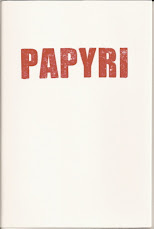There’s a girl
behind Pessoa. Hurrying over
the paving stones, she
turns her head. I wonder
what happened? No doubt
she was off to market
for a few bits of fish, not knowing
she’d be snapped. She’ll be dead
now. Maybe not. She’ll have
grandchildren, never have cared about poetry
and won’t suspect she’s been found
out. I doubt Pessoa saw her
coming, no friend to the looming
woman on the poet’s left –
and as for the thoughtful man
further back …
Where did the girl end up
that morning? Perhaps a car
idling around the corner
knocked her
down. It worries me, this
image from sixty years ago,
a tricked-out self
in a Portuguese town. What’s the good
of being here?
There’s a curious history behind this poem (just as there no doubt is for the girl behind Pessoa in the photograph above). The Spanish original, “Fotografía de poeta,” by Argentinian writer Jorge Accamé was originally shown to me by a friend of his, Gwenyth Perry, who’d asked him specifically for a poem for me to translate.
I found the original a little difficult to get into, and so enlisted the help of another poetic (albeit Spanish-less) friend, David Howard. David and I came up with the version above, which I duly included (with the original en face) in the poetry magazine I was editing at the time.
Shortly afterwards I received a letter from a High School Spanish teacher, chiding me for my inaccuracies, and including a complete literal version of the poem to help me correct them.
I was, of course, quite aware of the liberties we’d taken – working as a duo seemed to embolden us to take ever greater licence in recasting Accamé’s original – but it still seemed a bit ridiculous to think that an English poem should be judged solely in terms of the accuracy of its reflection of the original. Who knows, though? Maybe she was right.
David must have thought otherwise. The next thing I heard, he’d written some additional sections, and wanted to include the whole piece in his latest book of poems, called How to Occupy Our Selves (2003). This seemed to me to be going a bit too far in the opposite direction, but I nevertheless granted permission for my part, at least, in this unusually collaborative work.
“What’s the good / of being here?” – our version of the original’s “Ni siquiera tendría un buen motivo para estar allí” [it’s not certain that she had a good reason for being there] – came in for particular censure from the Spanish teacher, as I recall. Certainly we’d tweaked it up a notch (or so we thought): extending a rather offhand conclusion into something more “philosophical.”
Who’s the author, then? David clearly thinks he is. He includes one of the later segments of his own poem under the original title “A Photograph of the Poet” in his Incomplete Poems (2011), the most considerable collection of this work to date. I tend to think I am, since most of the actual translation was contributed by me. Others would attribute it more straightforwardly to Jorge Accamé, given that the original poem – most of which has survived even into our free adaptation – is definitely and definitively by him.
Perhaps the real answer is Pessoa himself. So potent is the influence of his identity-less persona, that the mere idea of it can still confuse us all eighty-odd years after his death.
Poems, Imitations & Translations
Thursday
Fernando Pessoa (2000)
Labels:
2000,
David Howard,
Fernando Pessoa,
Jorge Accamé,
Spanish,
translation
Subscribe to:
Post Comments (Atom)














.jpg)
No comments:
Post a Comment